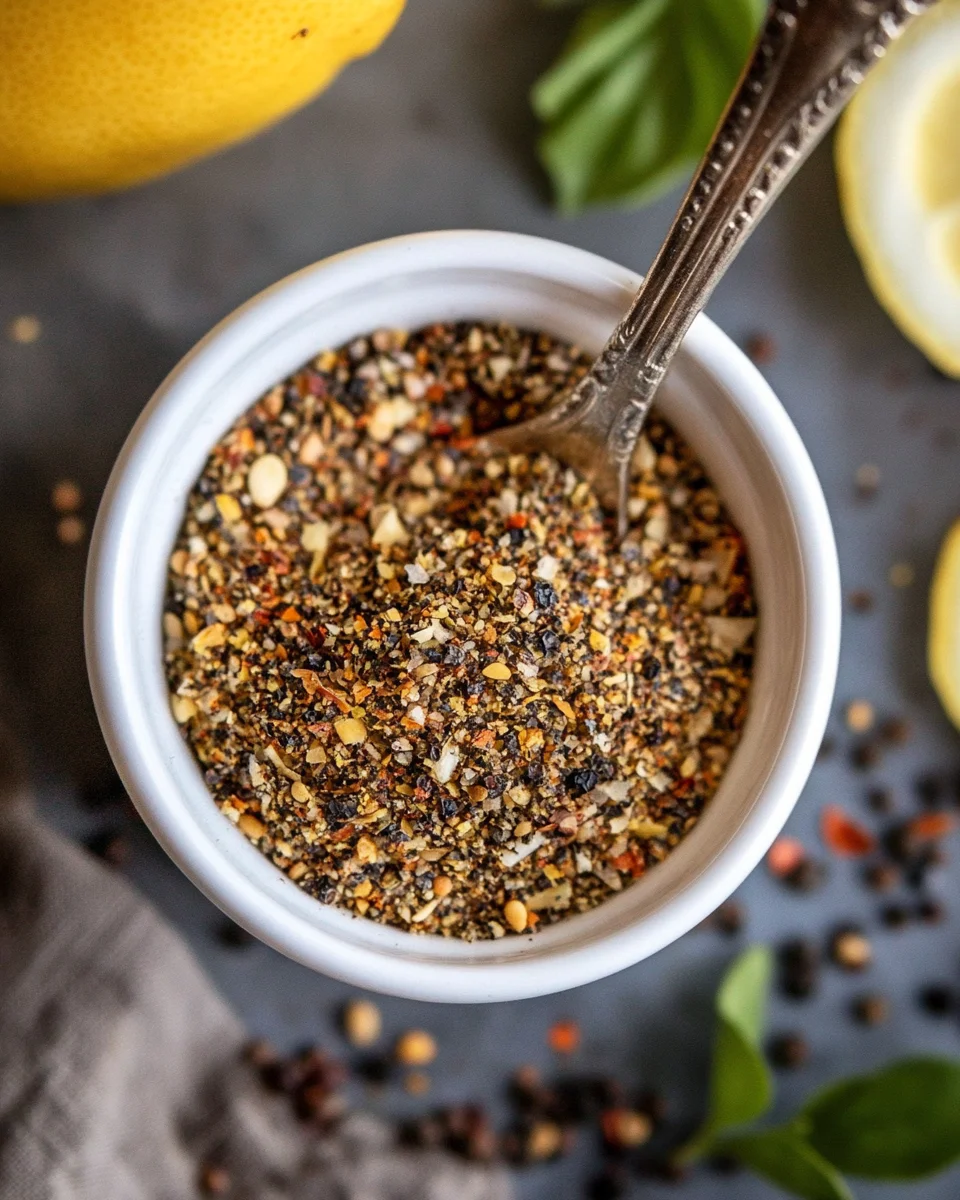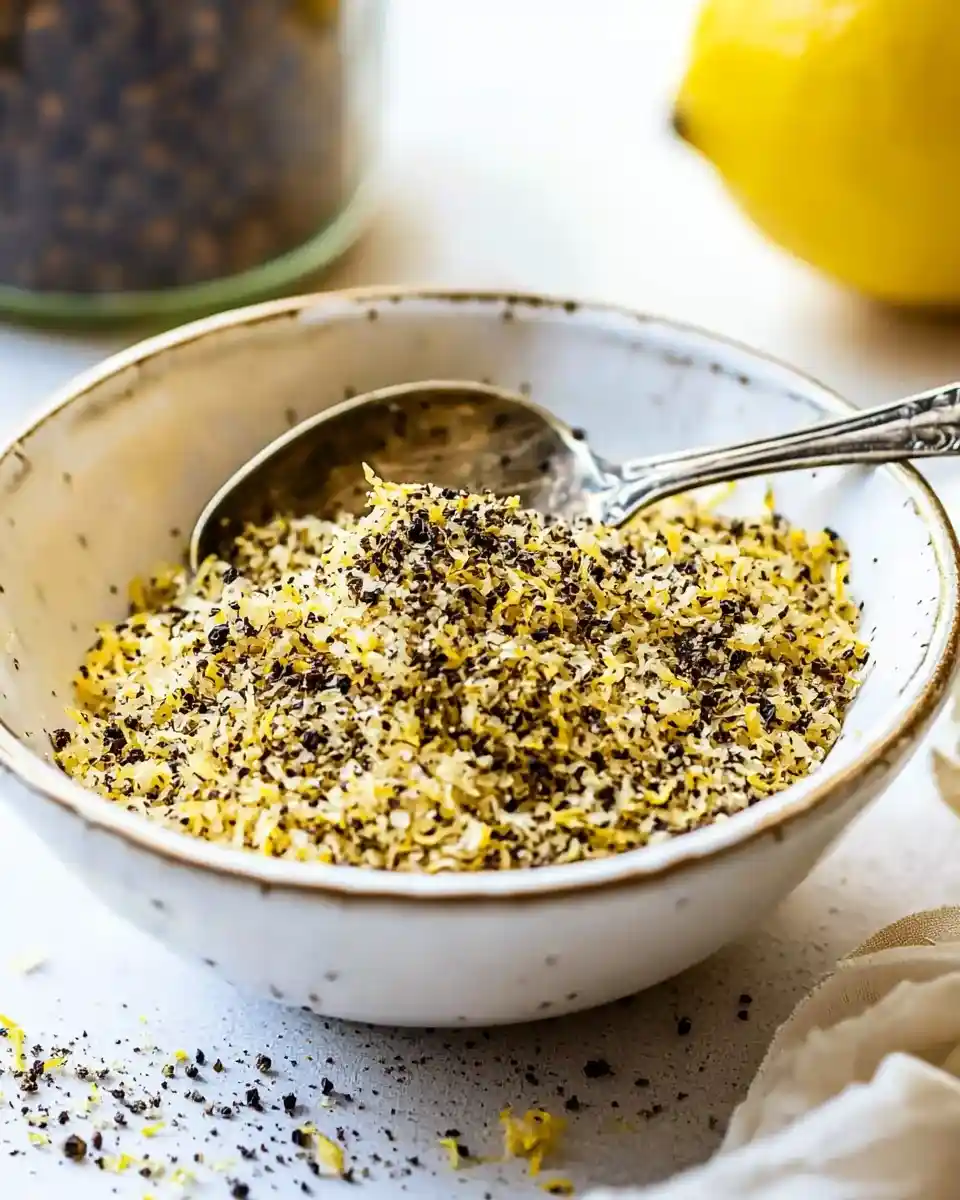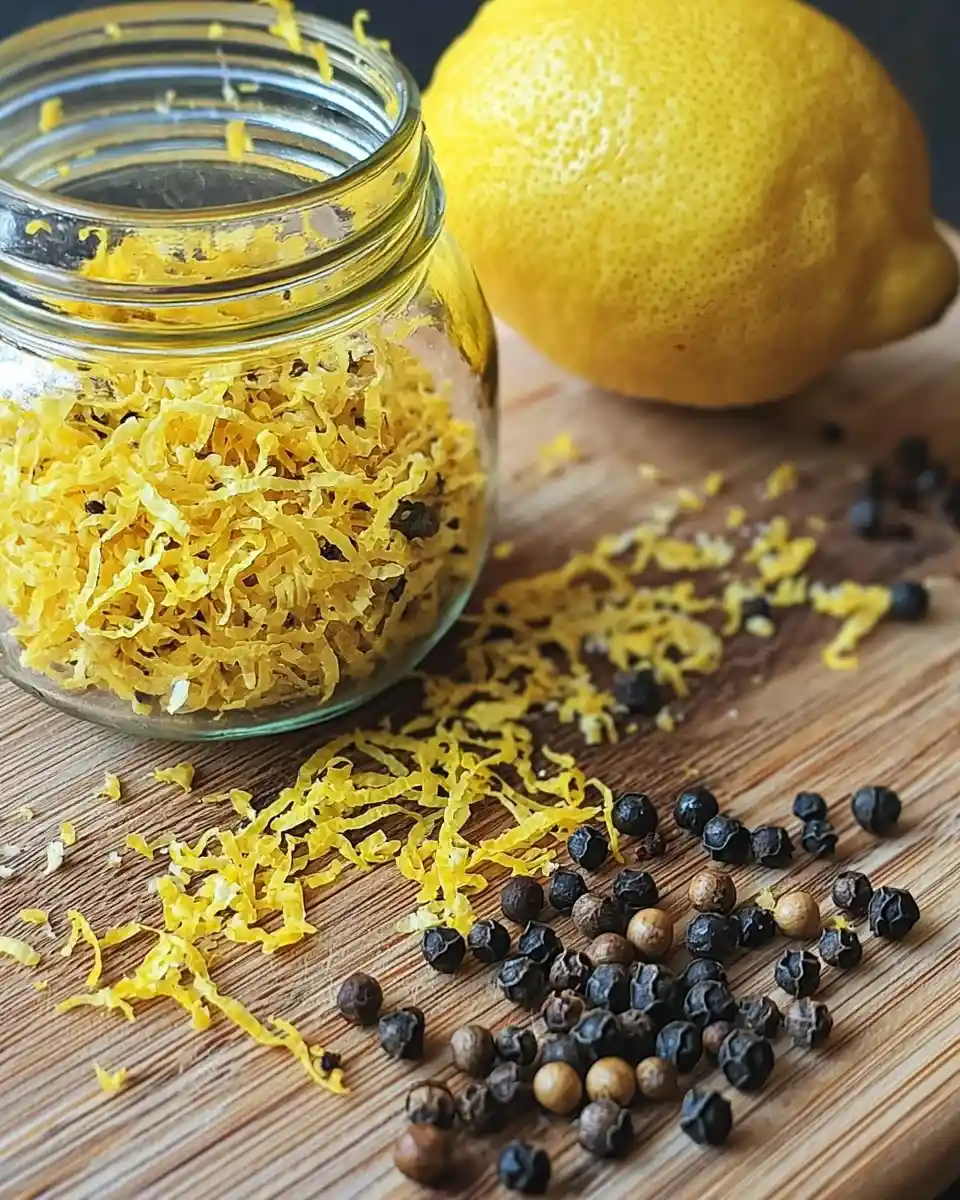I love the bright, citrusy smell of lemon pepper. It reminds me of my grandmother’s kitchen. Her lemon pepper chicken was famous in our family.
The blend makes simple dishes taste amazing. It adds a flavor that stays with you, making you want more.
This guide will cover its history and uses. We’ll look at its origins in the American South and its global appeal. You’ll learn about its key ingredients and how to make your own version at home.
Whether you’re an experienced chef or just starting out, this guide will help you use it to its fullest. You’ll discover how to make your dishes even more delicious.
Key Takeaways
This spice is a versatile seasoning blend that combines the bright, citrusy taste of lemon with the bold flavor of black pepper.
It originated in the American South in the 1920s and has gained popularity worldwide, adapting to various cuisines.
Homemade this seasoning typically includes dried lemon zest, fresh black pepper, garlic powder, onion powder, and dried herbs.
It offers a range of health benefits, including antioxidant properties, aiding digestion, and anti-inflammatory effects.
Incorporating it into your cooking can elevate the flavors of chicken, seafood, vegetables, and more.
What Is Lemon Pepper and Its Origins
This seasoning is a mix of lemon zest and black pepper. It’s a favorite in many kitchens today. It started in the American South in the 1920s. Cooks there mixed lemon rinds with peppery spices.
Historical Development in the American South
The exact start of this blend is a mystery. But, it became famous in Atlanta’s strip clubs like Magic City in the 1990s. Seasoned wings, mixed with Buffalo sauce, were a hit in the South.
Cultural Impact on Global Cuisine
Lemon pepper’s fame grew, and it became a hit worldwide. It fits into many cuisines, like Asian and Mediterranean. This shows its appeal as a gourmet seasoning.
Evolution into Modern Kitchens
Now, this blend is a must-have in kitchens everywhere. It’s loved for its citrus and pepper flavors. It’s great on potatoes, meats, salads, and veggies. This spice keeps adding flavor to dishes as cooking trends change.
Essential Ingredients for a Perfect Blend
Making a great seasoning blend is all about balance. At its core, it has dried lemon zest and fresh black pepper. These two give it the citrus taste and spicy kick that this mix is known for.
To make it even better, add some herbs and spices like garlic powder, onion powder, and dried oregano or thyme. These extras can deepen the flavor and make your blend stand out.
The secret to a top-notch seasoning blend is using the best ingredients. Choose high-quality citrus zest and fresh black pepper for the best smell and taste. By picking and mixing these key ingredients, you can make a seasoning blend that elevates your cooking.
- 3 tablespoons of dried lemon zest or granulated lemon peel
- 3 tablespoons of coarse ground black pepper
- 1 tablespoon of salt
- 1 1/2 teaspoons of garlic powder
- 1 1/2 teaspoons of onion powder
This homemade seasoning blend recipe makes about 8 tablespoons. You can keep it in an airtight container for up to 6 months. Use it to add a zesty touch to many different dishes.
Making Your Own Lemon Pepper at Home
Make your own seasoning at home. It’s a great way to add flavor to many dishes. You can use it on chicken, fish, veggies, and even popcorn. It’s a simple way to make your cooking better!
Preparation and Drying Methods
First, grate fresh lemon zest carefully. Make sure to avoid the bitter white pith. Spread the zest on a baking sheet and let it dry for 24-48 hours. This helps keep the flavor strong.
Mixing and Grinding Techniques
Grind black peppercorns into a fine powder using a spice grinder or mortar and pestle. Mix the dried lemon zest with the ground pepper in equal parts. You can adjust the mix to taste. This homemade blend is great for dry rubs, marinades, and more.
Storage Solutions
- Put the seasoning in an airtight container, like a glass jar or spice tin, to keep it fresh.
- Store it in a cool, dry place, away from sunlight, to keep the flavor for months.
- Don’t refrigerate it, as it might clump or congeal.
With these easy steps, you can make your own spice mix. It will make your cooking better and become a favorite in your kitchen. Enjoy the bright citrus and rich pepper flavors in your flavor enhancer, dry rub, and marinade recipes.
Kitchen Tools and Equipment Needed
To make your own chicken seasoning, herb blend, or tangy spice mix at home, you need a few basic tools. For the perfect lemon pepper seasoning, you’ll need some key items.
First, a zester or Microplane is essential for grating fresh lemon zest. This gives your seasoning its citrusy kick. Next, a spice grinder or small food processor is needed to grind peppercorns into a fine texture.
- Zester or Microplane for lemon zest
- Spice grinder or small food processor for peppercorns
- Mixing bowls for combining ingredients
- Airtight containers for storing the seasoning blend
- Fine mesh sieve for achieving a consistent texture
With these basic tools, you can easily make your own chicken seasoning, fragrant herb blend, or bold tangy spice mix in your kitchen.
Nutritional Benefits and Health Properties
This blend is not just tasty. It’s also packed with nutrients and health benefits. The lemon zest and black pepper in it offer vitamins, minerals, and antioxidants.
Vitamin Content Overview
The lemon zest in the seasoning is full of vitamin C. Just half a cup gives you over 100% of what you need daily. Vitamin C boosts your immune system, skin health, and helps you absorb iron. It also has vitamins A and B6, adding to your overall health.
Mineral Composition
- Calcium: This spice has a bit of calcium. It’s good for strong bones and teeth.
- Magnesium: This mineral is in the blend. It helps with energy, muscle function, and nerve health.
- Potassium: This seasoning has some potassium. It helps control blood pressure and supports heart health.
Health-Enhancing Properties
This seasoning has more than just nutrients. The lemon zest has antioxidant properties. It fights off harmful free radicals and reduces inflammation. Black pepper may help with digestion and have anti-inflammatory effects. Adding it to your meals can make them taste better and be healthier.
Perfect Lemon Pepper Wings Recipe
Make your game-day snacks unforgettable with this seasoned wings recipe. It’s a mix of zesty citrus and bold pepper that everyone loves. It’s perfect for parties or a tasty dinner any night of the week.
The secret to these wings is the seasoning. Mix the chicken wings with this blend, olive oil, garlic powder, and a bit of salt. The spice mix adds a unique flavor that makes these wings irresistible.
- Preheat your oven to 400°F (200°C).
- In a large bowl, combine 3 lbs of chicken wings (flats and drumettes), 2 tablespoons of this spice mix, 3 tablespoons of olive oil, 1 teaspoon of garlic powder, and 1/2 teaspoon of salt. Toss to coat the wings evenly.
- Arrange the seasoned wings on a baking sheet, ensuring they are in a single layer and not touching each other.
- Bake the wings for 40-45 minutes, flipping them halfway through, until they are crispy and the internal temperature reaches 165°F (74°C).
- For an extra flavor boost, sprinkle additional seasoning over the wings before serving.
Enjoy these wings with your favorite dipping sauces, like ranch or blue cheese. They offer a perfect mix of tangy, zesty, and peppery flavors. They’re sure to become a family favorite!
Baked Lemon Pepper Wings have roughly 776 calories per serving, compared to fried wings which have about 1100 calories per serving.
The secret to perfect seasoned wings is in the seasoning and baking. Use this blend, olive oil, and garlic powder for a flavor-packed, crispy wing. It’s healthier than fried wings.
So, get your ingredients ready, preheat your oven, and enjoy the ultimate seasoned wing experience. Bon appétit!
Ultimate Guide to Lemon Pepper Chicken
Seasoned chicken is a tasty dish that can be made in many ways. It’s perfect for a quick dinner or a fancy meal. This guide will show you how to make it like a pro.
Marinade Techniques
Try different marinades to get the right mix of tangy and zesty flavors. Use lemon juice, olive oil, and the spice for a simple marinade. Or, try a yogurt marinade for tender chicken with a hint of citrus.
For a stronger taste, mix soy sauce, honey, and citrus-infused pepper blend. This will give your chicken a bold flavor.
Cooking Methods
You can cook it in many ways. Grilling it over medium-high heat gives a charred outside and juicy inside. Baking at 400°F (200°C) for 25-30 minutes makes the skin crispy and the meat tender.
For a fast option, pan-fry the chicken and then bake it. This method works well too.
Serving Suggestions
Lemon pepper chicken goes well with many sides. Try it with roasted veggies like asparagus or broccoli for a healthy meal. The citrus flavor also pairs well with rice or pasta, making a full dinner.
Remember to drizzle the chicken with pan juices or lemon-garlic butter for extra flavor. By trying different marinades, cooking methods, and sides, you can make lemon pepper chicken even better. It’s a versatile dish that will surely delight your taste buds.
Creative Ways to Use Lemon Pepper
Lemon pepper is a gourmet seasoning blend that can make many dishes better. It’s not just for chicken or fish. This flavor enhancer lets you explore new flavors in the kitchen.
Try adding lemon pepper to your salad dressings for a zesty twist. Sprinkle it over roasted veggies like Brussels sprouts, carrots, or potatoes for a tasty side dish. For a quick snack, toss popcorn with melted butter and lemon pepper.
- Add lemon pepper to your favorite pasta dishes, from creamy alfredo to classic marinara.
- Use it as a dry rub for grilled meats, giving a delicious crust and balanced flavor.
- Rim cocktail glasses with lemon pepper for a unique and eye-catching look.
This kitchen staple is also great for seafood. Coat shrimp or scallops in lemon pepper before sautéing or grilling. Sprinkle it over baked or grilled salmon for a simple yet elegant dish.
“Lemon pepper is my go-to seasoning for adding a bright, citrusy punch to a wide variety of dishes. It’s a true kitchen essential that I always have on hand.”
Explore the versatility of lemon pepper in your cooking. It can turn ordinary ingredients into amazing dishes, whether savory or sweet.
Storing and Preserving Your Seasoning
Keeping your homemade lemon pepper seasoning blend fresh is key. Store it in airtight containers like spice jars or small multi-purpose jars. Place these containers in a cool, dry spot, away from sunlight and heat.
Container Selection
Choose containers with tight lids to keep the seasoning’s oils in. Glass or BPA-free plastic jars are good choices. They keep the seasoning blend fresh.
Environmental Factors
Heat, humidity, and sunlight can harm your citrus zest and black pepper. Store the containers in a cool, dark, and dry place. This will help your seasoning last longer.
Shelf Life Guidelines
Homemade lemon pepper seasoning can last up to 2 years if stored right. But for the best taste, use it within 12 months. Store-bought seasoning might last longer due to preservatives. Always check the expiration date and watch for signs of spoilage before using.
FAQ
What is lemon pepper and where does it originate from?
Lemon pepper is a mix of lemon zest and black pepper. It started in the American South in the 1920s. Cooks dried and ground lemon zest to blend with black pepper.
How has lemon pepper seasoning impacted global cuisine?
Lemon pepper has become popular worldwide. It’s used in Asian and Mediterranean cooking. It’s great for grilled meats, seafood, and veggies.
What are the key ingredients in lemon pepper seasoning?
Lemon pepper has lemon zest and black pepper. You might also find garlic powder, onion powder, and herbs like oregano or thyme. These add depth and complexity.
How can I make homemade lemon pepper seasoning?
Start by grating lemon zest and drying it for 24-48 hours. Grind black peppercorns finely. Mix the dried zest and ground pepper in equal parts, adjusting to taste.
What tools are needed to make lemon pepper seasoning?
You’ll need a zester or Microplane for lemon zest, a spice grinder for peppercorns, and mixing bowls. Use airtight containers for storage. A fine mesh sieve helps with texture.
What are the nutritional benefits of lemon pepper seasoning?
Lemon pepper has vitamins C, A, and B6 from lemon zest. It also has minerals like calcium, magnesium, and potassium. It’s good for digestion and may fight inflammation.
How can I use lemon pepper seasoning to make delicious wings?
Mix 2 lbs chicken wings with 2 tablespoons lemon pepper seasoning, 1 tablespoon olive oil, 1 teaspoon garlic powder, and 1/2 teaspoon salt. Bake at 400°F (200°C) for 40-45 minutes, flipping halfway. Sprinkle more lemon pepper before serving with ranch or blue cheese.
How can I use lemon pepper seasoning to make flavorful chicken dishes?
To make lemon pepper chicken, mix lemon juice and zest with olive oil, yogurt, or soy sauce and honey. Grill, bake, or pan-fry the chicken. Then, finish it in the oven.
Serve it with roasted veggies, rice, or pasta. This will add a burst of flavor to your meal.
How can I use lemon pepper seasoning in other dishes?
It is great for more than just chicken. Sprinkle it on roasted veggies for a zesty twist. Use it as a dry rub for meats or in salad dressings.
It’s also delicious on pasta, fish, popcorn, or even cocktail rims. Get creative and enjoy the flavor!
How should I store homemade lemon pepper seasoning?
Keep homemade lemon pepper in airtight containers. Store it in a cool, dry place, away from sunlight and heat. It can last up to 2 years.
But for the best taste, use it within a year. Make sure the lemon zest is dry to avoid mold.




3 thoughts on “Lemon Pepper: The Ultimate Guide to This Zesty Seasoning”